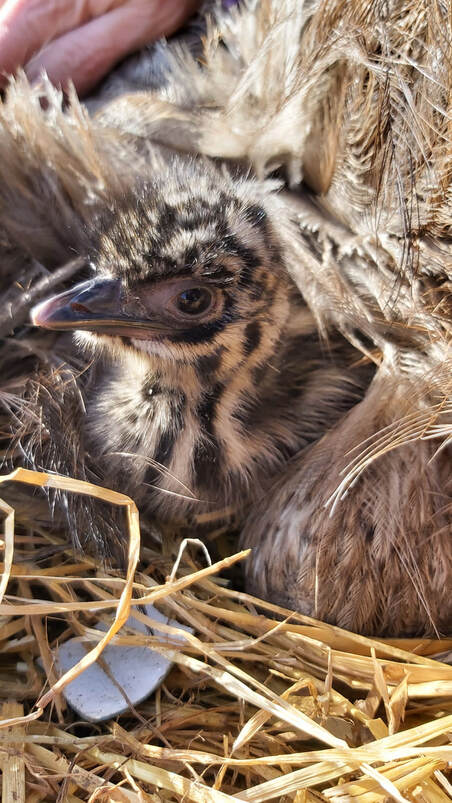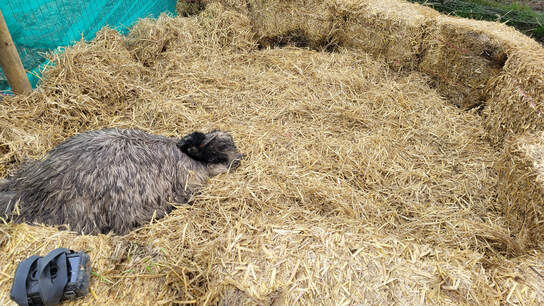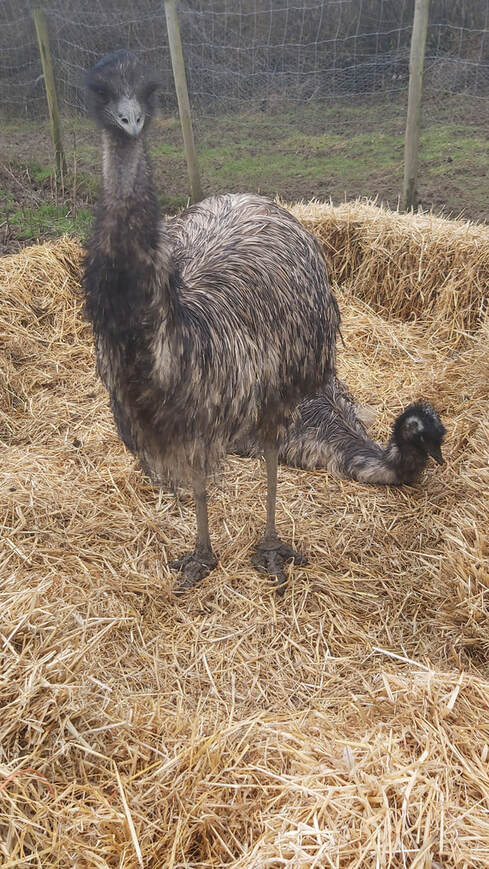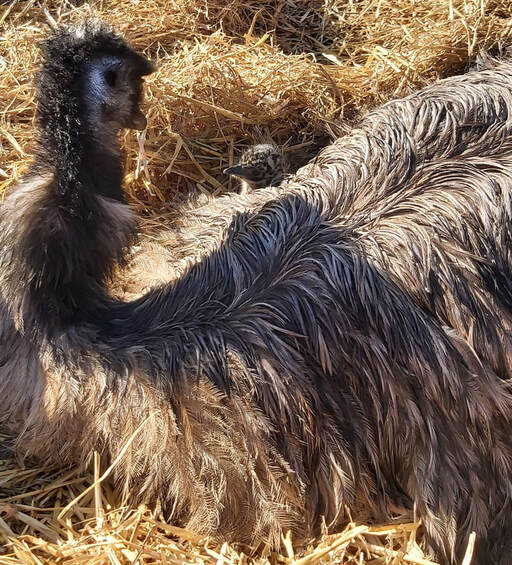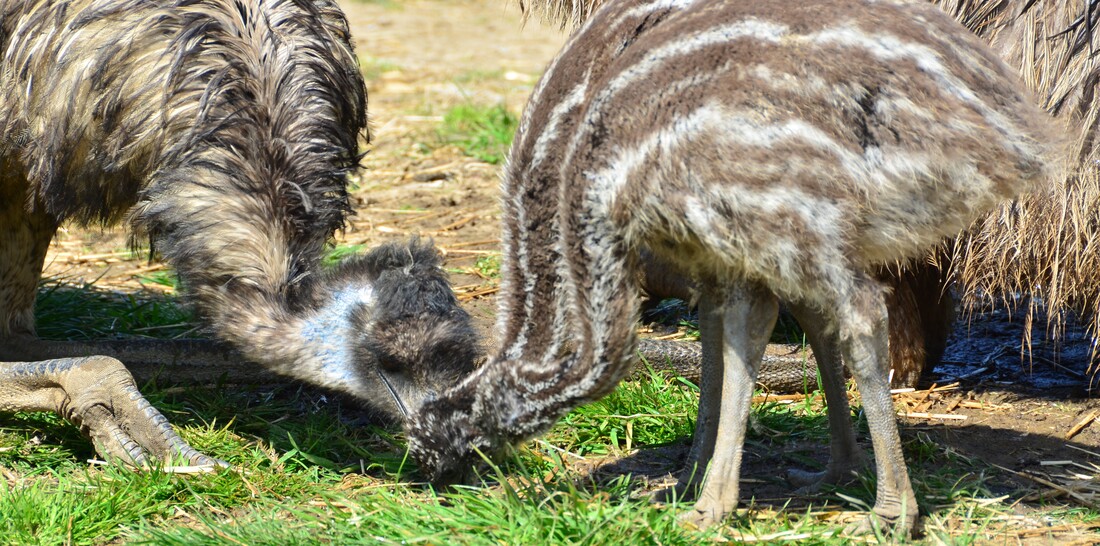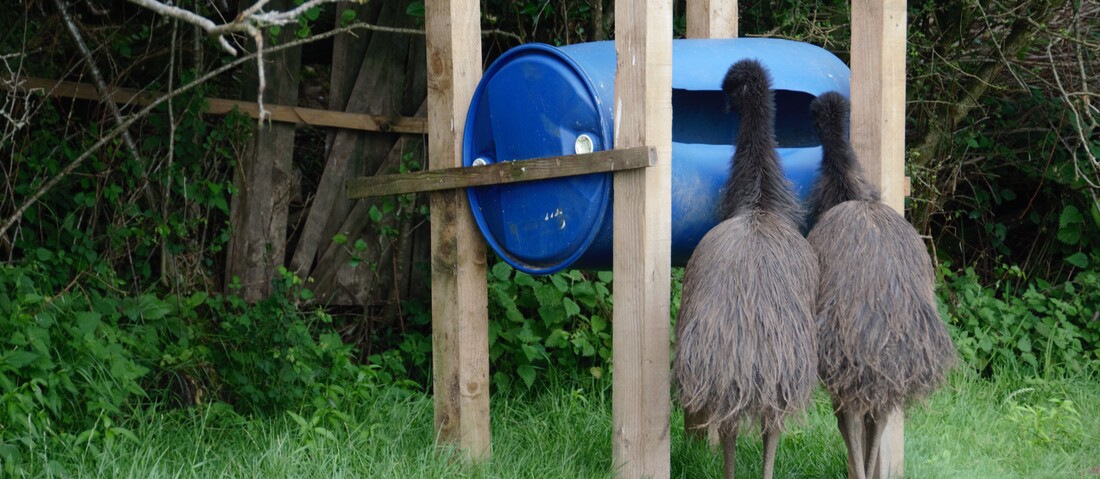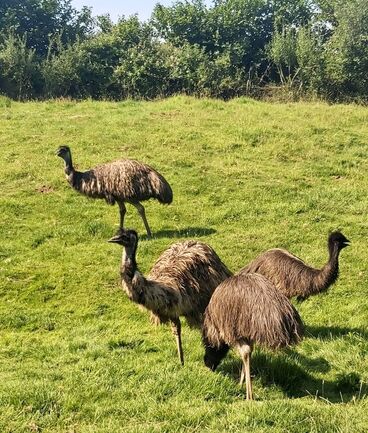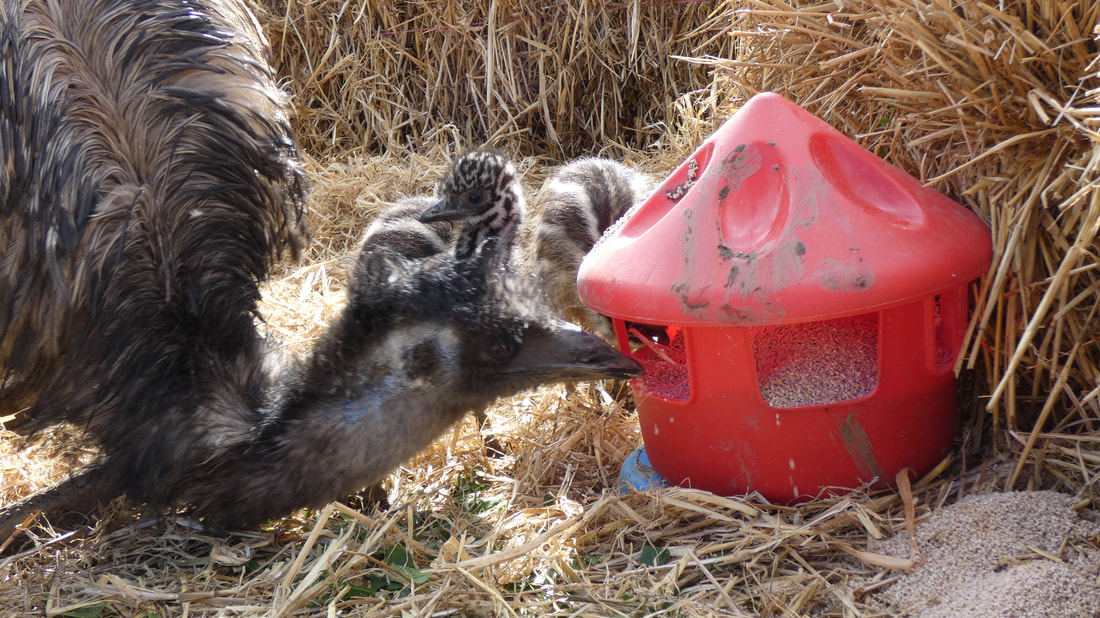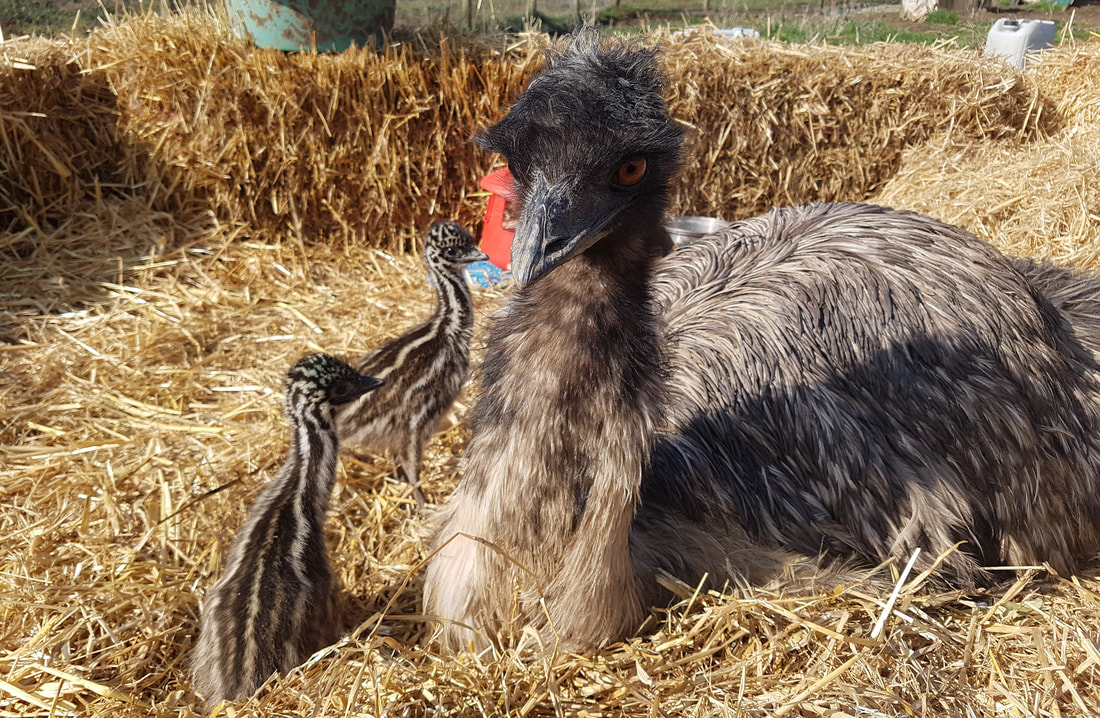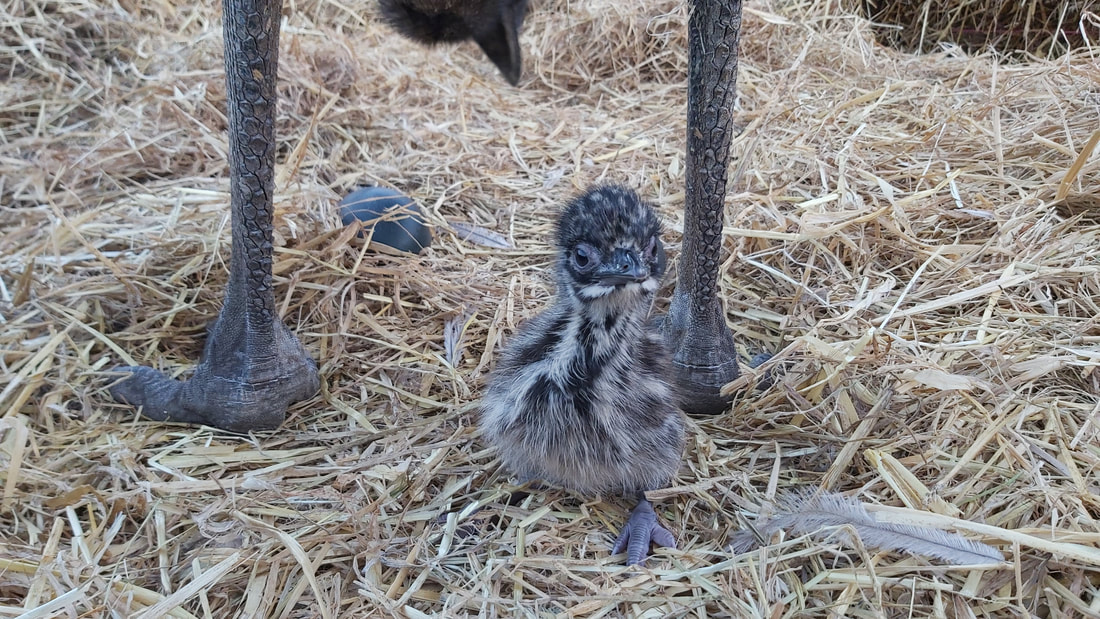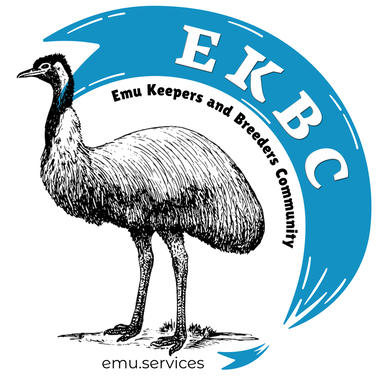Some ideas for letting the parent emu raise their chicks
If you are considering letting your emu rear their chicks themselves then you might find some useful information here. If you would like to let your males sit but then remove the eggs at the end of the sit then some of this information may also be useful. It is always worth letting your males sit on their nest if they would like to, as it helps them break out of the season, and helps them to feel as if they are fulfilling their role.
The SettingFirstly it must be said that allowing parents to raise their chicks has some drawbacks. Although there are success cases of females bringing up the chicks, it is not usually the case, females bringing up chicks with the father is an exception to the norm. Usually females will stamp on chicks and kill them. So if you are considering this, you must do this in a way where you can remove the female at hatch and be physically present there yourself to remove her straight away. Keeping in mind that your female may not be in a great mood around the chicks if she is that way inclined.
Also keep in mind that chicks raised by dad will be wild of temperament, they will not be cuddly, you may never be able to catch them or get hold of them and this may be needed if you ever need to move them on or, call out a vet or treat them for injury. Not all males will want to sit on a nest, but when they decide they want to, they can get quite broody! So, determining where to situate your broody male will need careful consideration from the start if you would like the chicks to hatch. Dad will want to decide where he sits, but you can narrow this down by placing him within a pen, safely away from predators who may be a threat to the chicks when they hatch. Somewhere like a barn, large pen or paddock is ideal. Remember to carefully net the pen, so the chicks will not be able to escape through any gaps in the fencing. A pen with a three sided shelter is ideal, as locking your emu pair in a barn is not great, because the parents will still need to exercise and stretch their legs whilst laying the eggs, and if mum is present she will not want to be cooped up for the entire sit, yet she will want to stay close by. |
If you don't have a suitable shelter, don't worry, as the father will be happy to sit outside, even in the coldest of weather, and, even with the option of a shelter the parents may decide to put the nest outside anyway; which can be infuriating for us humans, who want the best for our emu. You could try moving the eggs, whilst letting the parents see, so they know where they are being taken. Moving the eggs sometimes works, but other times the parents will decide to roll them back to their original location. It is worth noting the route the emu might take in doing this, in case they decide to roll them back through mud, since breeding season is always in the coldest, wettest time of year.
To keep the wind off dad, a nest of straw bales can be built around him. Be sure to make a small gap for mum to enter, if she desires, otherwise she may jump over the bales and cause an accident. Put some loose straw down too, dad will use this for his nest. Temporary fencing can be used around the parents and covered with scaffolding net or tarpaulin to keep the wind off. Make sure all posts are driven in deeply, creating solid fencing that will withstand strong winds.
Some may argue that straw shouldn't be used for emu. If they were incubator hatched then yes, there would be other options, such as carpet or artificial grass, but when outdoors straw will do the job well and keep dad and the chicks warm. The dads also like lots of material around them when the chicks hatch, as they are constantly rebuilding the nest around themselves and the chicks, bringing more straw in towards them.
To keep the wind off dad, a nest of straw bales can be built around him. Be sure to make a small gap for mum to enter, if she desires, otherwise she may jump over the bales and cause an accident. Put some loose straw down too, dad will use this for his nest. Temporary fencing can be used around the parents and covered with scaffolding net or tarpaulin to keep the wind off. Make sure all posts are driven in deeply, creating solid fencing that will withstand strong winds.
Some may argue that straw shouldn't be used for emu. If they were incubator hatched then yes, there would be other options, such as carpet or artificial grass, but when outdoors straw will do the job well and keep dad and the chicks warm. The dads also like lots of material around them when the chicks hatch, as they are constantly rebuilding the nest around themselves and the chicks, bringing more straw in towards them.
The Parents
|
You will notice the behaviours of emu change in breeding season, females and males can become aggressive and territorial, some emu will even develop an eye for their humans! This behaviour settles down after breeding season. The male may sit without eggs underneath him twitching his head and seeming quite catatonic at times. There is nothing wrong with him, he is just broody and wants to be on a nest.
Not all emu parents will get broody, especially females. Some female emu may actually harm the chicks at hatch. So it is worth noting the day the father sat on his eggs and counting forward 60 days to find his hatch day, then being present at the hatch to keep a close eye on the female. If you keep a very close eye on the female whilst dad is sitting and observe her behaviour, you can sometimes get an idea about what kind of mother she will be, although dominant behaviour towards you, does not mean she will harm the chicks. Parents who themselves were raised on the nest tend to make better parents themselves, but even so, incubator hatched emu make excellent parents too, as they carry the instinct. You may decide not to have mum in with the dad and the eggs once the male is settled. Keep in mind that the mum will still put eggs under the dad for a while once he has sat. Being around at the hatch is essential if the mother is present, she may or may not stamp on the chicks at hatch! The females also tend to be more clumsy than the dads, though there is every chance that she may be absolutely wonderful with them, guarding over the dad, and keeping away any predators. She might become aggressive towards any other emu on the outside of their paddock, considering them a threat. This could included humans too, in which case you may consider removing the mother, making it much easier for you to tend to the father. If you decide to keep the mum in, she will circle you and drum, all the while keeping a very close eye on you, again be guided by her behaviour, just because she is acting dominant, doesn't mean she will aggress you, she is doing her job to protect her male, and her chicks. It is worth keeping the mum in with the nest if you can, because observing both parents raise their young is the most beautiful thing, and as mentioned above, mum will keep any predators, such as foxes away from the chicks. |
Both parents may feel threatened by human presence, as is usually the case with even the most friendly of emu, so be sure to give them lots of space and observe from afar, talking to them gently and calmly, only tending to the male and putting food and water out for the female when necessary. If you approach the male, both parents will probably scrutinise your hand movements, to make sure you are not taking the eggs from under the dad. You might even get a hiss or a nip from the dad, and the mum might circle you and drum with her head back in a threatening posture. So, be guided by their behaviour. If the parents do not feel threatened by you there is a better chance of being allowed near the chicks and the father. Remember, you are going to need access to their pen to be able to care for them over the sit, hatch and the aftercare, so building trust with both parents is essential.
Both parents may feel threatened by human presence, as is usually the case with even the most friendly of emu, so be sure to give them lots of space and observe from afar, talking to them gently and calmly, only tending to the male and putting food and water out for the female when necessary. If you approach the male, both parents will probably scrutinise your hand movements, to make sure you are not taking the eggs from under the dad. You might even get a hiss or a nip from the dad, and the mum might circle you and drum with her head back in a threatening posture. So, be guided by their behaviour. If the parents do not feel threatened by you there is a better chance of being allowed near the chicks and the father. Remember, you are going to need access to their pen to be able to care for them over the sit, hatch and the aftercare, so building trust with both parents is essential.
Dad will not eat or drink while he spends his 60 days on the nest. He will lose a bit of weight over time, but will be fine.
Once the chicks have hatched, food and water ought be put out nearby for him, so he can access it from his nest.
Before breeding season emu will eat a lot in preparation for breeding (a good ratite feed is recommended to avoid ailments such as Wry Neck in the chicks), the female needs sufficient nutrition to produce healthy eggs and the male will need to put on weight for his sit. You can find how much weight your emu is building up by putting your arms over the emu's back and feeling behind the wings for the fat build-up in this area.
He may sit on 5 to a dozen or so eggs. It seems the most common amount of eggs is around 9, more than that and they start spilling out of the sides. The dad will throw out any none viable eggs. Occasionally, one of the eggs may start to smell, quite often the dad will carry on sitting on a smelly egg. If you can get to it, and be sure you have the smelly one, then it will not explode underneath him. An exploded egg will make him really smell and may affect the other eggs, since the shells are quite porous.
Once the chicks have hatched, food and water ought be put out nearby for him, so he can access it from his nest.
Before breeding season emu will eat a lot in preparation for breeding (a good ratite feed is recommended to avoid ailments such as Wry Neck in the chicks), the female needs sufficient nutrition to produce healthy eggs and the male will need to put on weight for his sit. You can find how much weight your emu is building up by putting your arms over the emu's back and feeling behind the wings for the fat build-up in this area.
He may sit on 5 to a dozen or so eggs. It seems the most common amount of eggs is around 9, more than that and they start spilling out of the sides. The dad will throw out any none viable eggs. Occasionally, one of the eggs may start to smell, quite often the dad will carry on sitting on a smelly egg. If you can get to it, and be sure you have the smelly one, then it will not explode underneath him. An exploded egg will make him really smell and may affect the other eggs, since the shells are quite porous.
The Hatch Of Emu Chicks On The Nest
|
As emu owners this is out of our hands, but it is the most wonderful thing to observe, though from a distance away, preferably on the outside of the pen. Let the parents be in complete control here as they will be anxious, only intervening if the female shows aggression towards the chicks.
Hopefully the chicks will hatch in quick succession, but since mum may still put eggs under dad after he first sits, then these eggs will take a few days longer to hatch. Once the first chicks become active the father will be up and down to tend to them, leaving any unhatched eggs to get cold. Chicks that hatch a few days after the first may likely get left behind, since the dad will be busy tending to the older chicks. In this case, once the first eggs have hatched, it is advised to remove any eggs left more than a couple of days, and put them in an incubator for a better chance of survival (put them next to your body to keep them warm on the way to the incubator). This is something to consider should there be a 2 or 3 day gap between the hatching of the first eggs and the next. If the nest is within a barn, then a heat lamp may be used to keep warm any younger, less developed chicks. |
An emu dad tending his chicks whilst mum keeps watch with a warning drum to the humans. Keeping a respectful distance and not grabbing the chicks will help the parents feel secure in your presence. |
|
The chicks will be under dad for the first couple of days keeping warm and resting, after which they will become more active, coming out occasionally, whilst gaining confidence in the outside world. It is then they will start eating and drinking. Us humans will not need to do anything here apart from putting out food and water in appropriate containers; the parents will show the chicks the food and water. Spinach and kale, chopped up and scattered around, or placed on top of the chick crumb will also be good for the chicks. Order in extra though, as the parents will eat it too. Put adult ratite feed and ratite chick crumb out within easy reach of the nest when the first hatching is done, or before the chicks hatch, in preparation, covering the food from rain if the nest is outdoors. Water containers for the chicks need to be quite sturdy, so they don't get knocked over, making the nest damp, yet shallow enough that the chicks will not drown in them, or get cold should they fall into the water. A larger water container for the adults can be placed higher up out of the reach of the chicks. The parents will likely prefer eating the chick crumb to their own feed, though they also eat the chick crumb to show the chicks it is food, so it is wise to order plenty of feed in advance of the hatch, ordering enough for the parents to tuck into aswell. |
The communication between emu parents and the young is fascinating to watch and hear; it is certainly the best time to observe emu sounds. The female will do lots of drumming and the male will communicate with the chicks constantly via his actions, grunts and hisses. He will hiss to warn of potential danger when they venture too far from him, and to stay away from things he feels may be of danger to them; or sometimes if they just wander too far away from the proximity of the nest. The actions of the father are really interesting too, he will do things like tapping them on the head with his beak to show them things and give them warnings.
Getting older
The chicks will stay with the parents from around 5 - 18 months and with the parents present they can be released from the pen earlier than you would release young emu on their own out with other emu. Space is key here, with enough space and hiding places the chicks and their parents can be released at around 2 or 3 months old. If the mother is present she will look after the chicks and keep them protected from other emu, dad will also look out for them but the females tend to be more alert to dangers than the males. Emu outside the family may likely not hurt the young, they will be more fascinated by them than anything and will likely approach them, other males may try and adopt them, but the parents will shoo them away, usually without the need for aggression.
It is worth noting that emu brought up on the nest will not have the same friendliness that comes with incubator chicks, since they are imprinted to their parents rather than humans. This is worth keeping in mind when you come to sell them later, or you want to develop a relationship with them. You may not want to keep emu which are related to your own, and wild emu are quite hard to catch and load, it is likely that you wont be able to get anywhere near them when they are older. But it has it's pros too because emu brought up by their parents will then likely go on and be good parents themselves, and for emu lovers it is wonderful to observe the parents raise their young, and to give the emu the opportunity.
It is worth noting that emu brought up on the nest will not have the same friendliness that comes with incubator chicks, since they are imprinted to their parents rather than humans. This is worth keeping in mind when you come to sell them later, or you want to develop a relationship with them. You may not want to keep emu which are related to your own, and wild emu are quite hard to catch and load, it is likely that you wont be able to get anywhere near them when they are older. But it has it's pros too because emu brought up by their parents will then likely go on and be good parents themselves, and for emu lovers it is wonderful to observe the parents raise their young, and to give the emu the opportunity.
